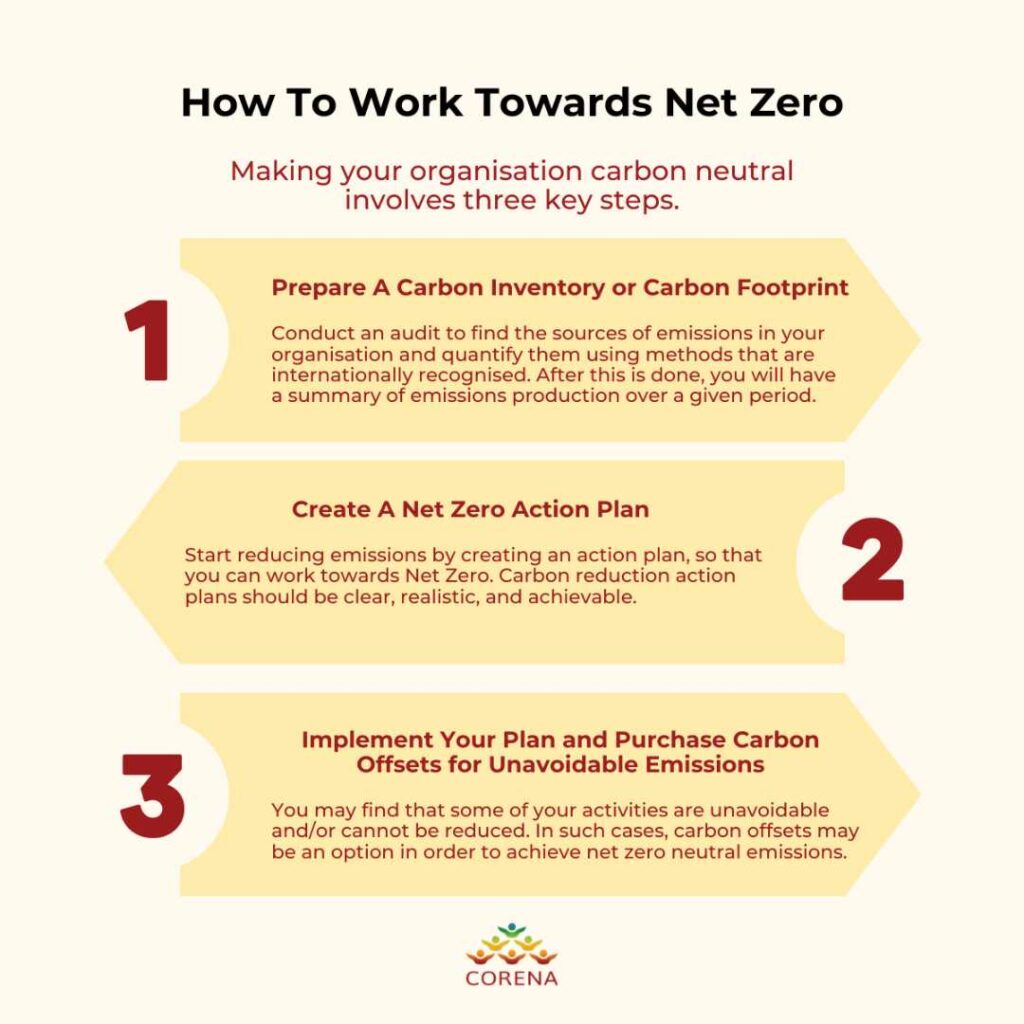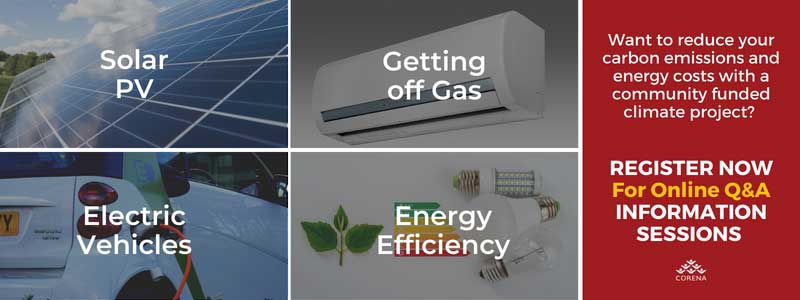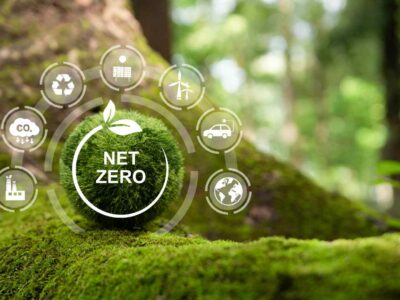The science tells us that we need to rapidly shift to net zero and together reduce our greenhouse gas emissions. An increasing number of businesses, organisations, and countries alike, are making commitments and taking tangible actions in order to become carbon neutral.
No matter your size, whether big or small, making your non profit carbon neutral is vital to tackling the climate emergency. To help you understand the requirements and navigate the process, we’ve put together this guide for non profit organisations on becoming carbon neutral.

What Does Being Carbon Neutral Really Mean?
A carbon neutral or net zero organisation balances the volume of carbon emissions (commonly known as greenhouse gases) that it sends into the atmosphere with those it takes away. There are subtle differences between these and other terms but for most non-profits the main thing is that they convey our ultimate aim to quickly reduce carbon emissions.
Carbon emissions cover carbon dioxide, methane and other greenhouse gases that are released by burning fossil fuels such as coal and oil. This burning arises from many sources: production of electricity, construction, manufacturing, aviation, haulage, and more.
In Australia, carbon emissions for organisations are calculated using processes set under the National Greenhouse Emissions Reporting Scheme (NGERS). All organisations emitting 25,000 tonnes of CO2 equivalent or more must report their carbon emissions under this scheme. Most non-profits (unless very large) are unlikely to trigger this threshold but the same carbon accounting methods can be used voluntarily for your own internal reporting purposes and working towards carbon neutrality.
How To Work Towards Net Zero
Making your organisation carbon neutral involves three key steps.
1. Prepare A Carbon Inventory or Carbon Footprint
Conduct an audit to find the sources of emissions in your organisation. Once these emissions are identified, they must be quantified (calculate the quantity of them) using methods that are internationally recognised. After this is done, you will have a summary of emissions production over a given period.
CORENA can help provide technical assistance and resources to help you review your carbon emissions.
If your organisation is large, then the task may be done better by external consultants. But if you are a fairly small non-profit then you should be able to prepare this in-house.
Learn more in How To Calculate Your Organisation’s Carbon Footprint
2. Create A Net Zero Action Plan
Now you understand your key sources of carbon emissions, you can start reducing emissions by creating an action plan, so that you can work towards Net Zero.
Carbon reduction action plans should be clear, realistic, and achievable. As an added benefit, you may find some actions will reduce your operating costs, providing a better budget to implement other works. CORENA can provide advice on funding opportunities to support your action plan.
Below is an example of a typical action plan structure including some key actions most non profits could undertake.
| Category | Action | Budget & Source | Savings ($ and CO2) | Timeframe |
| Monitoring | Install real time energy monitoring at <list sites and breakdown for monitoring>. eg School buildings – Main office, classrooms, irrigation pumps, canteen and air conditioning. | $5,000 CORENA loan | Savings depend on anomalies detected by monitoring. | June 2023 |
| Energy Audit | Conduct an energy audit at <insert sites here>. | $2,000 (CORENA loan or internally funded) | The audit will identify energy efficiency measures and provide estimated capital costs for implementing them. | June 2023 |
| Solar Panels & Storage | To install XkW solar panels at; <list sites and system sizes eg North city retirement village community centre – 10kW Food box delivery depot – 15 kW etc > | $50,000 Grant plus CORENA loan | $15,000 and 60 tonnes of CO2/year | December 2023 |
| Electric Vehicles | Replace 3 fleet vehicles with electric vehicles <eg food delivery vans, home or site visit vehicles | $30,000 (cost over an above cost of typical vehicle purchase) CORENA loan | $10,000 and 14 tonnes of CO2 /year | Total/partial replacement of current fleet within 5 years |
| Heat Pumps | Replace hot water system at <insert site/s here> (eg Senior Citizens Centre – hairdressing salon) | $3000 (above typical replacement cost) Grant | $1200 and 2 tonnes of CO2 /year | Total/partial replacement of current heating/cooling within 3 years |
| Induction Stovetops | Source quotes and investigate feasibility of replacing stovetops in commercial kitchen | $0 Internal research with assistance from CORENA | To be determined in feasibility study | March 2023 |
Remember you\’re creating a unique working plan specific for your YOUR organisation, so the more specific for your context, the better.
It\’s not worth creating an action plan if you don’t use it! To give it the greatest chance of success this document should be adopted by your governing body. Stick to 10-15 achievable key actions with the biggest impact rather than trying to list every single thing you could do. It should have a reasonably short term of 1-3 years and be reviewed by a key group of internal stakeholders (often called a green team) to assess your progress every year.
At this meeting you can go through your plan, report on progress, change any actions that may no longer be relevant and add in new actions. This is an excellent opportunity to present your progress to your committee/board to gain further support for action. It is a good idea to put systems in place that allow you to easily re-do a carbon inventory every year, that way you can show the actual impact your actions are having.
Learn more in 5 Ways CORENA Helps Non Profits Reduce Carbon Emissions & Energy Costs
3. Implement Your Plan and Purchase Carbon Offsets for Unavoidable Emissions
As you work through your overall plan, you may find that some of your activities are unavoidable and/or cannot be reduced. In such cases, carbon offsets may be an option in order to achieve net zero neutral emissions. Carbon offsets are certificates that are associated with actions that reduce atmospheric carbon emissions. With the purchase of these certificates, organisations are able to provide funds for projects fighting climate change, rather than lowering their own emissions. These certificates offset the purchaser’s emissions with an equal amount of greenhouse gas reductions elsewhere. Remember, offsets should be part of a package of measures to become carbon neutral, with the focus on unavoidable emissions. You should be able to reduce your emissions significantly with energy efficiency, getting off gas and renewable energy.
Carbon Neutral Certification
You can be certified as carbon neutral if your organisation can meet the Australian Government’s Climate Active Carbon Neutral Standard. This is a great way to show that your organisation is serious about reducing emissions and has completed a rigorous and transparent process to get to carbon neutral status. However, if your organisation doesn’t have the resources to do this, what is most important is that you have an ongoing and systematic focus on reducing carbon emissions.
Carbon Neutral Project Funding for Non Profits
CORENA, can provide free technical advice and zero interest funding to not for profits, charities, community organisations and social enterprises looking to reduce their emissions and green their energy consumption. We are funded by donations from local community members across Australia. Donations help fund:
- Solar Panels
- Installing energy efficiency measures such as switching to efficient alternatives or installing insulation
- Getting Off Gas – Replacement of fossil gas appliances with electric alternatives
- Electric Vehicles
- A combination of the above
Interest Free Climate Project Loans For Non Profits, Community Organisations, Charities, & Social Enterprises
You don’t pay any interest on your CORENA loan, and the quarterly loan repayments are set to be a little less than the savings on your operating costs averaged over a year. This means you are never out of pocket. After your loan is fully repaid, you will reap the full financial benefit of having lower operating costs.
To learn more, check out how to apply for a loan, or register for one of our upcoming Online Q&A Information Sessions.


